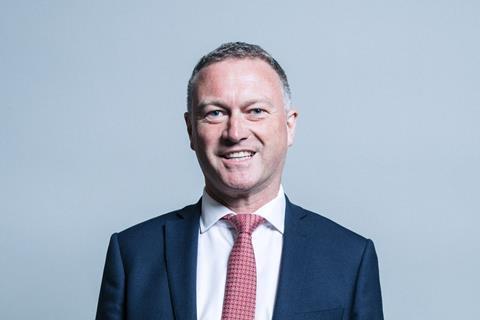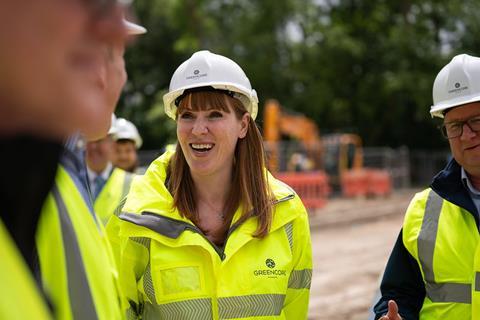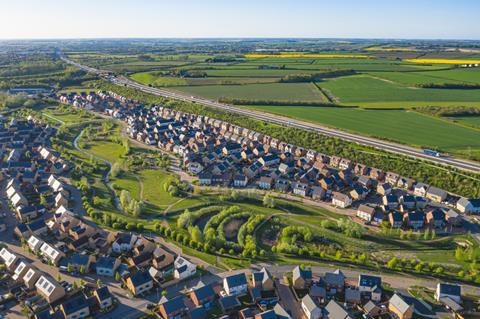Angela Raynerтs replacement held the shadow housing brief in 2021 and now he returns to the role in government. But although he has promised to тbuild, baby, buildт, Reed lacks the influence on Keir Starmer that his predecessor had

Probably not since John Prescott has there been a prominent, household-name politician so closely associated with government ambitions to build its way out of the countryтs housing market failure as Angela Rayner.
While in opposition, Keir Starmer and Rachel Reeves would regularly be pictured in hi-vis and hard hats and once the 2024 general election swept Labour into power it was Rayner, the deputy prime minister and housing secretary, who seemed to understand, like Prescott, the importance of housing development т including social housing т as well as planning reform.
The parallels with Prescott т who died last year т are obvious: both northern, working class, popular within the party and widely recognised by the general public. Both also made it to the office of deputy prime minister.
Of course, it was in her dual role as housing secretary Rayner that was charged with putting housebuilding т тgetting Britain buildingт т front and centre of the Starmer administration.
Now Rayner has resigned and has been replaced by the less high-profile Steve Reed as housing secretary. David Lammy replaces her as deputy prime minister т but without the housing brief.
Should the housing sector be a little worried that its time at the very top table might be coming to an end?

Reed does have some experience in housing. During his time at Lambeth council, which he led between 2006 and 2012, he was co-chair of the Vauxhall-Nine Elms-Battersea regeneration board т although whether this will allay concerns is doubtful given how well that particular initiative has gone.
He was also briefly shadow housing secretary between 2020 and 2021, notably using his time in the role to rail against his opposite number Robert Jenrick who had been caught up in the Westferry Printworks scandal.
>> See also: Pennycook keeps housing brief following reshuffle of junior ministers
Reed then spent two years as shadow justice secretary before Starmer appointed him shadow environment secretary in 2023, moving with the role into government following Labourтs 2024 election victory and remaining there until last Friday.
Itтs fair to say Reed has been on a journey in terms of his views of planning and housing.
As shadow environment secretary he opposed then housing secretary Michael Goveтs attempted nutrient neutrality reforms, which he described as тreckless and irresponsibleт before conceding after entering government that the тstatus quo is not workingт.
Back when he was shadow housing secretary he said Jenrickтs proposed planning reforms, which suggested giving developers automatic outline permission in designated тgrowth areasт, were designed to тsilence communities and hand control over planning to developersт.
Now he is championing Labourтs planning reforms, which include limiting the number of schemes that can be scrutinised by councillors at planning committees and scrapping key legal challenges against infrastructure schemes.
In an interview with The Telegraph on Sunday, Reed said his mantra was тbuild, baby, buildт, and promised to тmove on to the next stage in unleashing one of the biggest eras of building in our countryтs historyт.
So how have housebuilders reacted to his appointment?
тHis predecessor made a bold start on reforming the planning system and empowering the English regions to strive for growth,т said Melanie Leech, chief executive of the British Property Federation.
тWe now need to collectively ensure that that agenda not only continues but that government works with the real estate industry closely to help deliver our collective ambitions.т
>> See also: The Reform party conference: what a Farage government would mean for housing, investment and тnet-stupid-zeroт
Jonathan Layzell, chief executive of housing association Stonewater, said it was essential that Reed sticks to Raynerтs commitments to affordable housing investment, adding: тContinued clarity and consistency from the government will be key to maintaining momentum and ensuring the sector can keep delivering the homes and support our communities need.т
But Federation of Master Builders chief executive Brian Berry urged Reed not to back any measures that would further increase costs for housebuilders, including proposed reforms to the landfill tax.

тAny additional cost on delivering new homes would be a backwards step when we need more, not fewer, homes to be built,т he said.
From Reedтs public statements, it appears likely that he will continue to back Raynerтs planning reforms as part of the governmentтs ambition to build 1.5 million homes by the end of this Parliament.
It is also very unlikely that the Starmer governmentтs focus on affordable housing, with social rented housing prioritised, will change. The government in the summer announced a 10-year ТЃ39bn Social and Affordable Homes Programme along with other measures, including a 10-year rent settlement, in a bid to boost affordable housing delivery. There has also been an audible sigh of relief in the housing sector that Matthew Pennycook, a figure generally respected in social housing circles, will remain as housing minister. It was Pennycook after all who has been immersed in the technical detais of the governmentтs myriad changes to social housing policy, something Rayner did not involve herself in to the same extent.
What Reed will lack though is a direct line into Starmerтs office and into the top levels of Labour party HQ, both of which Rayner had through her roles as deputy prime minister and deputy party leader respectively.
Rayner was also a totemic figure for the Labour left, a former Corbyn loyalist backed by the partyтs disputatious backbenchers and someone whose voice was ignored at Starmerтs peril. This is not the case with Reed.
That suggests the voice of housing will sound just a little bit quieter in Number 10 and the sector might just have to speak a bit louder to ensure it is heard.
At a glance: Steve Reedтs political career
1998т2006 Lambeth councillor
2006т2012 Leader, Lambeth Council
2012 (Nov) Elected MP for Croydon North
2019т2023 Shadow roles (Children, Civil Society, Communities, Justice, Environment)
2024тSept 2025 Secretary of State for Environment, Food & Rural Affairs
Sept 2025тpresent Secretary of State for Housing, Communities & Local Government























No comments yet